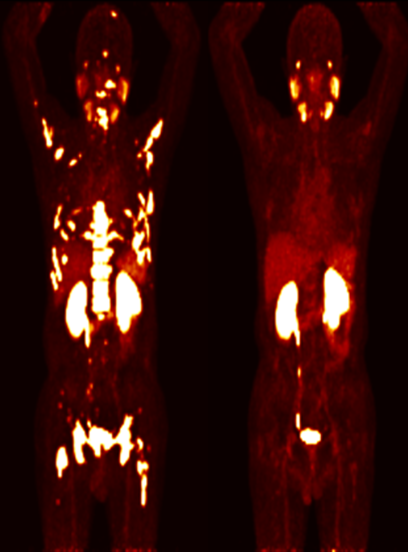CellBion, a prominent Korean pharmaceutical company, has announced that its groundbreaking prostate cancer drug, Lu-177-DGUL, is attracting considerable attention.
On Monday, the Ministry of Food and Drug Safety (MFDS) designated Lu-177-DGUL as the 11th agent to benefit from its “Global Innovative Products on Fast Track” (GIFT) program, signifying a significant milestone in the quest to offer a beacon of hope for prostate cancer patients who currently have limited viable treatment options.
Lu-177-DGUL is a drug designed to combat metastatic castration-resistant prostate cancer (mCRPC) in adult patients who exhibit positivity for prostate-specific membrane antigen (PSMA) and have been unresponsive to standard treatment protocols.
The drug selectively binds to the PSMA, which enables targeted delivery of therapeutic radiation to prostate cancer cells. The subsequent DNA damage induces cell death, thereby reducing tumor size and disease progression.
What sets Lu-177-DGUL apart is not only its innovative mechanism of action but also its origin. The drug serves as a testament to CellBion's remarkable capabilities in research and development. Impressively, the interim results from its phase 2 clinical trial indicate that its performance surpasses that of global competitors. Among patients with measurable disease, the objective response rate (ORR) exceeded 80 percent, and a notable 52.2 percent of trial participants experienced a reduction of over 50 percent in their PSA levels. These compelling findings position Lu-177-DGUL as a beacon of significant hope for patients worldwide who are grappling with end-stage prostate cancer.

CellBion said it is fully committed to bringing this revolutionary treatment to market, with approval and launch targeted for the first half of 2024. The company is also aiming to broaden its network of collaborative hospitals for more extensive clinical trials. Currently, clinical trials are ongoing at reputable institutions including Seoul National University Hospital, Seoul National University Bundang Hospital, Asan Medical Center, and Chonnam National University Hwasun Hospital. Additional trials at other major hospitals are under consideration.
Moving forward, CellBion intends to maintain its strong collaboration with the MFDS. The company's primary objective is to establish concrete evidence of Lu-177-DGUL's efficacy and safety.
As part of its commitment to revolutionizing the treatment landscape, CellBion is preparing for the launch of Lu-177-DGUL in the Korean and broader Asian markets in 2024.
The development trajectory of Lu-177-DGUL symbolizes a profound leap forward in medical science, the company said.
“With the upcoming launch, we find ourselves imbued with a renewed sense of hope and optimism. This moment signifies more than just a scientific achievement; it epitomizes the power of human ingenuity in our relentless pursuit of life-saving solutions,” a company official said.

